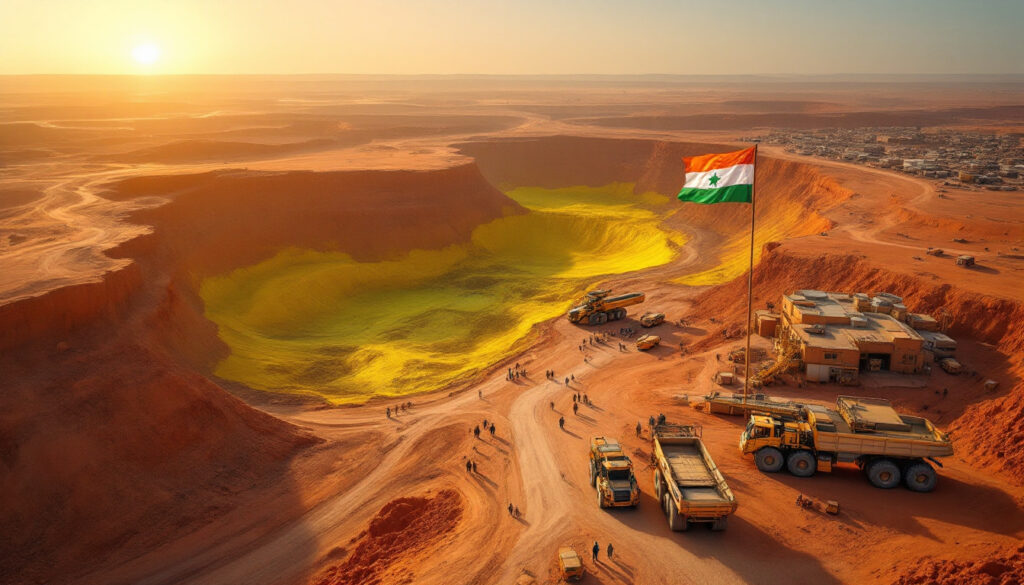Orano's Legal Battle: Uranium Mining Tensions in Niger
What is happening with Orano in Niger?
French uranium mining giant Orano has escalated its conflict with Niger's military government by filing a lawsuit on May 13, 2025, citing "arbitrary arrest, illegal detention and unjust confiscation of property." This legal action marks a significant turning point in the deteriorating relationship between the French company and Niger's government, which came to power following a military coup in 2023.
The conflict intensified when Niger security forces conducted raids on Orano's subsidiary offices in Niamey, seizing employees' phones and electronic devices. Most concerning is the situation involving mining director Ibrahim Courmo, who remains unreachable after being taken to Niger's intelligence agency headquarters.
"The detention of our management staff and seizure of company property represents a serious violation of due process and corporate rights," an Orano spokesperson told Reuters, speaking on condition of anonymity due to the sensitive nature of the ongoing dispute.
Key developments in the Orano-Niger dispute
The recent conflict follows a pattern of escalating tensions:
- Orano filed its lawsuit in Niger's domestic courts on May 13, 2025
- Niger security forces raided multiple Orano subsidiary offices in Niamey last week
- Managing directors of subsidiaries were held and interrogated by authorities
- Mining director Ibrahim Courmo was taken to intelligence headquarters and remains incommunicado
- Staff phones, computers, and electronic devices were confiscated during the raids
This crisis represents the culmination of Niger's increasingly aggressive stance toward the French company that has operated in the country for decades. Orano (formerly Areva) has been a cornerstone of Niger's mining sector, with its subsidiary Somair being a major uranium producer where Orano holds approximately 63% ownership.
Why are Western mining companies facing pressure in the Sahel region?
The Orano case exemplifies a broader regional trend across the Sahel, where military governments in Niger, Mali, and Burkina Faso have intensified pressure on Western mining operations. This shift reflects growing resource nationalism as these countries seek to exert greater sovereignty over their natural resources.
"What we're witnessing is an unprecedented wave of resource nationalism across the Sahel region," explains Dr. Maurice Tanner, Director of the Center for African Mining Studies. "These military governments are responding to longstanding public sentiment that foreign companies have exploited their resources without adequate compensation to local economies."
The pattern across the region is striking:
- Niger seized control of Orano's Somair uranium mine in December 2023
- Niger stripped Orano subsidiary Imouraren of its mining permit in June 2024
- Canadian company GoviEx Uranium lost its mining rights in July 2024
- Mali's government arrested foreign mining executives and confiscated gold stocks
- Burkina Faso's military leadership announced plans to nationalize foreign-owned mines
This coordinated push against Western mining interests comes as Russia and China increase their influence in the region, offering military support and infrastructure development with fewer governance conditions than traditional Western partners.
How has the Niger government targeted Orano's operations?
The Niger government has systematically targeted Orano's uranium operations through increasingly aggressive measures. The timeline reveals a calculated strategy to gain control of the country's uranium resources:
May 2025: Security forces raid offices of Orano subsidiaries including Somair, Cominak, Imouraren SA, and Orano Mining in Niamey, confiscating equipment and detaining staff.
May 2025: Mining director Ibrahim Courmo is taken to intelligence headquarters without formal charges.
December 2023: Niger unilaterally seizes control of the Somair uranium mine, which historically produced approximately 2,000 tonnes of uranium annually—representing about 5% of global supply.
June 2024: Niger government revokes the mining permit for Imouraren, one of the world's largest undeveloped uranium deposits with estimated reserves of 200,000 tonnes.
"The targeting of Orano appears methodical and strategic," notes mining analyst Emma Cartwright. "Niger's military leadership is using both legal mechanisms and security operations to assert control over uranium assets that have historically been dominated by French interests."
Niger's uranium deposits are particularly valuable, featuring relatively high-grade ore with an average concentration of 0.3% to 0.5% uranium oxide—significantly higher than global averages. This quality, combined with relatively accessible mining conditions, makes these assets particularly attractive for government acquisition.
What are the implications for global uranium markets?
Niger ranks as the world's seventh-largest uranium producer, accounting for approximately 5% of global supply. With nuclear energy gaining renewed attention amid the clean energy transition, disruptions to Niger's uranium production could have ripple effects across global markets.
Uranium prices have shown increased uranium market volatility since Niger's military coup, with spot prices reaching $70 per pound in early 2025—up from $50 in 2023. Industry analysts suggest this volatility reflects market uncertainty about future supply chains.
"The uranium market is particularly sensitive to geopolitical disruptions due to its concentrated production and strategic importance," explains nuclear fuel analyst James Harrington. "With roughly 440 nuclear reactors operating worldwide and dozens more under construction, stable uranium supply chains are crucial for energy security."
"European utilities are particularly exposed to Nigerien supply disruptions, as the EU sources approximately 20% of its uranium needs from Niger." — World Nuclear Association Annual Market Report, 2024
Key concerns for global markets include:
- Potential production delays or stoppages at Niger's uranium mines
- Increased uranium pricing pressure as buyers seek alternative suppliers
- Heightened regulatory scrutiny of uranium supply chains
- Growing premium for uranium sourced from politically stable jurisdictions
- Accelerated exploration in Canada, Australia, and Kazakhstan as alternatives
For Orano specifically, the Niger crisis represents both operational and financial challenges. The company derives approximately 15% of its global uranium production from Niger operations, making this dispute material to its business outlook.
How does this fit into broader resource nationalism trends?
The actions against Orano exemplify a growing trend of resource nationalism that extends beyond the Sahel region. Across Africa and globally, governments are reassessing relationships with foreign mining companies, often seeking increased ownership, higher royalties, or complete nationalization.
Resource nationalism patterns across West Africa
Military governments in the Sahel have been particularly aggressive in asserting control over natural resources:
- Mali imposed additional taxes on gold miners in 2024, targeting operations by B2Gold and Barrick Gold
- Burkina Faso announced plans to review all mining contracts in February 2025
- Guinea renegotiated terms with Chinese aluminum producers in 2023
- Zimbabwe implemented a ban on raw lithium exports in 2022 to capture more value domestically
"What makes the Sahel situation unique is the coordination we're seeing across military-led governments," notes political risk consultant Maria Alvarez. "There appears to be a shared playbook for asserting sovereign control over resources that were previously managed under agreements negotiated with democratic predecessors."
Industry experts have identified several common tactics:
- Permit revocations citing technical violations or environmental concerns
- Forced renegotiation of mining agreements under threat of closure
- Security interventions justified by alleged legal infractions
- Creation of state mining entities to assume control of assets
- Implementation of export restrictions or additional taxation
This trend poses significant challenges for mining companies with exposure to politically volatile regions, resulting in higher risk premiums and reluctance to commit to long-term investments.
What legal options does Orano have?
Orano's decision to file a lawsuit in Niger's courts represents a first step in challenging the government's actions, but legal experts suggest this may be just the beginning of a complex and lengthy legal battle.
Legal and diplomatic challenges
Orano faces several challenges and potential remedies:
-
Domestic legal proceedings: The company's lawsuit in Niger courts alleges arbitrary arrest and illegal detention of staff plus unjust property confiscation. However, success through domestic channels may be limited given the political climate.
-
International arbitration: Orano likely has access to international arbitration under the France-Niger Bilateral Investment Treaty, which provides protections against expropriation without compensation.
-
Diplomatic intervention: The French government could apply diplomatic pressure, though France's influence in Niger has waned significantly since the 2023 coup.
-
Force majeure claims: Orano may invoke force majeure clauses in contracts with customers to address supply disruptions.
Mining law specialist Dr. Helena Forrester notes: "Companies facing resource nationalism often pursue parallel legal strategies—maintaining domestic litigation while preparing for international arbitration. The challenge in Niger's case is that the military government may not recognize arbitration rulings."
International mining arbitration cases typically take 3-5 years to resolve and can cost each party $10-50 million in legal fees. Historical precedents suggest mixed outcomes, with some companies receiving partial compensation while others face protracted disputes with limited recovery.
"Successful resolution often requires finding a negotiated solution that allows both parties to claim victory. Pure legal strategies rarely produce optimal outcomes in resource nationalism disputes." — International Mining Disputes Journal, 2024
Understanding the Geopolitical Context
The Orano-Niger dispute cannot be separated from the complex geopolitical shifts occurring across the Sahel region. Following military coups in Mali, Burkina Faso, and Niger between 2020-2023, these countries have pivoted away from traditional Western allies, particularly France, toward closer relationships with Russia and China.
The Russian Wagner Group (now Africa Corps) has established security agreements in the region, while Chinese companies have secured mining and infrastructure contracts. This changing landscape creates additional complications for Western mining companies.
"French companies face particular challenges in the region due to rising anti-French sentiment," explains geopolitical analyst Dr. Jean-Marc Thierry. "Military leaders in these countries have effectively channeled public frustration over economic inequality and security concerns into opposition to French corporate interests."
The uranium deposits in Niger hold strategic significance beyond their commercial value. As nuclear power gains renewed interest as a low-carbon energy source, control of uranium resources provides geopolitical leverage in global energy markets.
FAQ: Understanding the Orano-Niger dispute
What triggered the recent escalation between Orano and Niger?
The immediate trigger appears to be the detention of Orano's mining director Ibrahim Courmo and raids on company offices in Niamey. However, tensions have been building since Niger's 2023 military coup, with the government systematically asserting greater control over uranium resources previously managed by the French company.
Anti-French sentiment has grown following the coup, with military leaders claiming that previous uranium agreements disproportionately benefited France while leaving Niger—one of the world's poorest countries—without fair compensation for its resources.
How might this dispute affect global uranium markets?
While immediate market disruptions have been limited due to existing inventories and diverse supply chains, continued uncertainty around Niger's uranium production could contribute to supply concerns and price volatility. This is particularly significant as global demand for nuclear fuel increases amid the energy transition.
Uranium market analysts project a supply deficit of approximately 30 million pounds by 2028 as new nuclear plants come online, particularly in China and India. Any disruption to Niger's production could exacerbate this supply-demand imbalance.
For European utilities, which have historically relied on Niger for approximately 20% of their uranium supply, diversification efforts are already underway, with increased attention to Canadian and Kazakh sources. Meanwhile, the recent US ban on Russian uranium has further complicated the global nuclear fuel supply chain.
Are other mining companies at risk in the region?
Yes, the pattern across the Sahel region suggests foreign mining companies face increasing pressure from military governments seeking greater control over natural resources. Companies operating in Mali, Burkina Faso, and Niger should anticipate potential challenges to their operations and ownership structures.
Gold miners in Mali have already faced increased taxation and permit reviews, while Burkina Faso's leadership has signaled similar intentions. Companies with exposure to these markets have reported increased security costs and regulatory uncertainty.
"The risk profile for Western mining companies across the Sahel has fundamentally changed," notes mining risk consultant Robert Williams. "Boards are now factoring in significantly higher political risk premiums when evaluating continued operations or new investments in the region."
In this challenging environment, many companies are awaiting the potential impact of the Trump mining permits order which aims to expand domestic mining operations in the US.
What are the geopolitical dimensions of this dispute?
The conflict between Orano and Niger reflects broader geopolitical tensions, including:
- Declining French influence in its former colonies
- Increasing Russian security presence through Wagner Group/Africa Corps
- Growing Chinese economic investment across the Sahel
- Competition for critical minerals essential to energy transition
- Military governments seeking new international partnerships
Resource control has become a key aspect of sovereignty assertions by military governments seeking to distance themselves from Western influence while securing new partnerships that offer fewer governance conditions.
Outlook and Implications
The Orano-Niger dispute represents a pivotal moment in the evolving relationship between Western mining companies and resource-rich African nations. While the immediate focus remains on the legal proceedings and staff detentions, the broader implications for uranium markets and mining investment in the Sahel will unfold over months and years.
For investors and industry observers, this case highlights the growing importance of political risk assessment in mining valuations. Companies with diversified geographical portfolios and strong local partnerships may prove more resilient as resource nationalism pressures intensify globally.
As the clean energy transition accelerates demand for critical minerals including uranium, supply chain security will remain a central concern for energy security planners and nuclear utilities worldwide. Recent developments, including the Paladin uranium halt at its Namibian operations and the US uranium production surge, further highlight the volatility and strategic importance of this critical resource.
According to a recent investigation by Mining.com, tensions between Orano and Niger have been brewing for years before this current legal action, with the military government specifically targeting French economic interests across multiple sectors.
Disclaimer: This article contains analysis of geopolitical events and market conditions that may change rapidly. Projections about future uranium prices or supply conditions represent informed opinions based on current information and should not be construed as investment advice.
Want to Stay Ahead of Major Mining Discoveries?
Discovery Alert's proprietary Discovery IQ model delivers real-time notifications on significant ASX mineral discoveries, turning complex data into actionable investment insights. Explore why major mineral discoveries can lead to substantial returns by visiting our dedicated discoveries page and start your 30-day free trial today.




